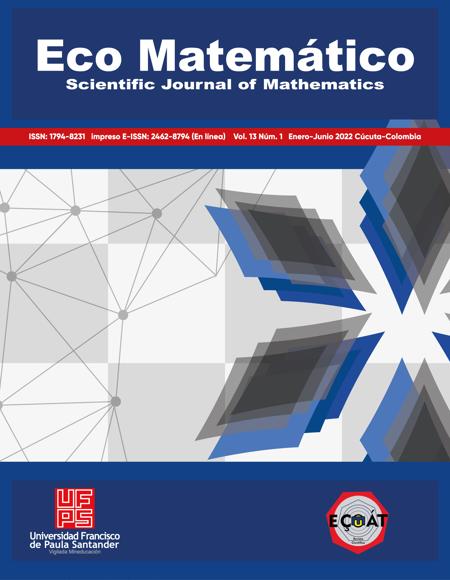Forms of probabilistic reasoning of sixth grade students of secondary education
Formas de razonamiento probabilístico de estudiantes de sexto grado de educación secundaria
Main Article Content
This research seeks to identify the forms of probabilistic reasoning used by sixth-grade students when faced with situations involving random events. This is a qualitative and exploratory study based on five categories of probabilistic reasoning proposed by Sánchez and Benítez (1997), where the levels of lack of prediction, determinism, mechanical, pre-rigor and rigor determine the students' lines of reasoning when faced with problems involving probability. The data were collected from a questionnaire, semi-structured interviews and participant observation processes. Fifteen sixth-grade students of basic secondary education from an official educational institution in the city of Cali, Colombia, participated in the study. The results show that when students face problems involving the concept of probability, a level of reasoning prevails over others, and they generally resort to their beliefs to solve them, which can affect their performance in the learning processes. It is concluded that it is of great importance that teachers identify beliefs and subjective thinking elements of students before planning interventions to teach probability in classrooms.
Downloads
Article Details
Ang, L. H., & Shahrill, M. (2014). Identifying Students’ Specific Misconceptions in Learning Probability. International Journal of Probability and Statistics, 3(2), 23–29. https://doi.org/10.5923/j.ijps.20140302.01
Barragues y Guisasola. (2009). Una propuesta para la enseñanza de la probabilidad en la universidad basada en la investigación didáctica. Educación Matemática, 21(3), 127–162. Recuperado de: http://funes.uniandes.edu.co/13192/1/Barragues2009Una.pdf
Batanero, C. (2013). (2013). La comprensión de la probabilidad en los niños. ¿Qué podemos aprender de la investigación? En J. A. Fernandes, P. F. Correia, M. H. Martinho, & F. Viseu,. Atas Do III Encontro de Probabilidades e Estatística En La Escuela. Braga: Centro de Investigación En Educación. Universidad Do Minho, 1–13. Recuperado de: https://www.ugr.es/~batanero/pages/ARTICULOS/1Batanero.pdf
Batanero, Carmen. (2006). Razonamiento probabilístico en la vida cotidiana: un desafío educativo. Investigación En El Aula de Matemáticas. Estadística y Azar. http://www.ugr.es/~batanero/pages/ARTICULOS/ConferenciaThales2006.pdf
Batanero, Carmen, Chernoff, E. J., Engel, J., Lee, H. S., & Sánchez, E. (2016). Research on Teaching and Learning Probability. https://doi.org/10.1007/978-3-319-31625-3_1 DOI: https://doi.org/10.1007/978-3-319-31625-3
Batanero, Carmen, & Sanchez, E. (2005). What is the Nature of High School Students’ Conceptions and Misconceptions About Probability? Exploring Probability in School, 241–266. https://doi.org/10.1007/0-387-24530-8_11 DOI: https://doi.org/10.1007/0-387-24530-8_11
Gutierrez, R., & Ojeda, M. M. (2016). El papel de algunas opciones tecnológicas en la educación estadística. Heurística, 18, 21–35. Recuperado de: https://www.researchgate.net/profile/Mario-Ojeda/publication/312398845_EL_PAPEL_DE_ALGUNAS_OPCIONES_TECNOLOGICAS_EN_LA_EDUCACION_ESTADISTICA/links/587d07c808ae9a860ff0e472/EL-PAPEL-DE-ALGUNAS-OPCIONES-TECNOLOGICAS-EN-LA-EDUCACION-ESTADISTICA.pdf
Ben-Zvi, D. (2018). Foreword. In & E. P. A. Leavy, M. Meletiou-Mavrotheris (Ed.), Statistics in early childhood and primary education: supporting early statistical and probabilistic thinking (pp. vii–viii). Springer Singapur. Recuperado de: https://www.researchgate.net/publication/326587840_Preface_to_volume_Statistics_in_Early_Childhood_and_Primary_Education_Supporting_Early_Statistical_and_Probabilistic_Thinking
Budgett, S., & Pfannkuch, M. (2019). Visualizing Chance: Tackling Conditional Probability Misconceptions. In G. Burrill & Ben-Zvi (Eds.), Topics and Trends in Current Statistics Education Research, Monographs ICME-13 (pp. 3–25). Springer International Publishing. https://doi.org/10.1007/978-3-030-03472-6_1 DOI: https://doi.org/10.1007/978-3-030-03472-6_1
Burbano-Pantoja, V. M. Á., Valdivieso-Miranda, M. A., & Aldana-Bermúdez, E. (2017). Conocimiento base para la enseñanza: un marco aplicable en la didáctica de la probabilidad. Revista de Investigación, Desarrollo e Innovación, 7(2), 269–285. https://doi.org/10.19053/20278306.v7.n2.2017.6070 DOI: https://doi.org/10.19053/20278306.v7.n2.2017.6070
Camargo, L. (2021). Estrategias Cualitativas de investigación en educación matemática (1st ed.). Ed. Universidad de Antioquia-Universidad Pedagógica Nacional de Colombia. Recuperado de: https://conferencia.ciaem-redumate.org/index.php/xvciaem/xv/paper/viewFile/1061/568
Fajardo & Benítez, D. (2020). influencia de las creencias de los estudiantes en la resolución de problemas en educación matemática. Revista de Educación Matemática, 35(3). Recuperado de: https://revistas.unc.edu.ar/index.php/REM/article/view/28106
Fischbein, E. (1975). The intuitive sources of probabilistic thinking in children. Recuperado de: https://link.springer.com/book/10.1007/978-94-010-1858-6 DOI: https://doi.org/10.1007/978-94-010-1858-6
García, J., & Sánchez, E. (2013). Niveles de razonamiento probabilístico de estudiantes de bachillerato frente a una situación básica de variable aleatoria y distribución. Actas de Las Jornadas Virtuales de Didáctica de La Estadística, Probabilidad y Combinatoria , 417–424. Recuperado de: https://www.researchgate.net/publication/326158345_Niveles_de_razonamiento_probabilistico_de_estudiantes_de_bachillerato_frente_a_una_situacion_basica_de_variable_aleatoria_y_distribucion
Gómez Torres, E. (2016). Estadística Y Probabilidad En El Currículo Colombiano Para Educación Básica Y Media. XXVI Simposio Internacional de Estadística 2016, 1–5. Recuperado de: https://docplayer.es/42683957-Estadistica-y-probabilidad-en-el-curriculo-colombiano-para-educacion-basica-y-media.html
Groth, R. E., Austin, J. W., Naumann, M., & Rickards, M. (2021). Toward a theoretical structure to characterize early probabilistic thinking. Mathematics Education Research Journal, 33(2), 241–261. https://doi.org/10.1007/s13394-019-00287-w DOI: https://doi.org/10.1007/s13394-019-00287-w
Hernandez, A., Batanero, C., Gea, M., & Rocio, A. (2021). Research on children’ s reasoning in comparing probabilities probabilities. March. Recuperado de: https://www.researchgate.net/publication/350103195_Research_on_children's_reasoning_in_comparing_probabilities
Hernández, R., Fernández, C., & Baptista, L. (2010). Metodología de la Investigación (5th ed.). México D.F. McGraw-Hil. Recuperado de: https://www.icmujeres.gob.mx/wp-content/uploads/2020/05/Sampieri.Met.Inv.pdf
Inzunza, S. (2014). Geogebra: Una herramienta cognitiva para la enseñanza de la probabilidad. Congreso Iberoamericano de Ciencia, Tecnología, Innovación y Educación, 1–11. Recuperado de: https://docplayer.es/38490613-Geogebra-una-herramienta-cognitiva-para-la-ensenanza-de-la-probabilidad.html
Jones, G. A., Langrall, C. W., Thornton, C. A., & Timothy Mogill, A. (1997). A framework for assessing and nurturing young chiedren’s thinking in probabieity. Educational Studies in Mathematics, 32(2), 101–125. https://doi.org/10.1023/A:1002981520728 DOI: https://doi.org/10.1023/A:1002981520728
Jones, G. A., & Thornton, C. A. (2005). An Overview of Research into the Teaching and Learning of Probability. In Exploring Probability in School (pp. 65–92). https://doi.org/10.1007/0-387-24530-8_4 DOI: https://doi.org/10.1007/0-387-24530-8_4
Kahneman, D., & Tversky, A. (1972). Subjective probability: A judgment of representativeness. Cognitive Psychology, 3(3), 430–454. https://doi.org/10.1016/0010-0285(72)90016-3 DOI: https://doi.org/10.1016/0010-0285(72)90016-3
MEN. (1998). Lineamientos Curriculares de Matemáticas. Cooperativa Editorial Magisterio, 103. Recuperado de: https://www.studocu.com/co/document/universidad-del-valle-colombia/matematica-basica/lineamientos-curriculares/9530727
MEN. (2006). Estándares Básicos de Competencias en Matemáticas. Estándares Básicos de Competencias En Lneguaje, Matemáticas, Ciencias y Cuidadanas, 46–95. https://doi.org/958-691-290-6
Nicolson, C. (2005). Is chance fair? A student’s thoughts on probability. Teach Kids Math, 12(2), 83–89. Recuperado de: https://eric.ed.gov/?id=EJ756749 DOI: https://doi.org/10.5951/TCM.12.2.0083
Piaget, J., & Inhelder, B. (1951). La genèse de l’idée de hasard chez l’enfant.Recuperado de: https://issuu.com/ediciones_morata/docs/piaget_psicolog__a_del_ni__o/65
Polaki, M. V. (2002). Using instruction to identify mathematical practices associated with Basotho elementary students’ growth in probabilistic thinking. Canadian Journal of Science, Mathematics and Technology Education, 2(3), 357–370. https://doi.org/10.1080/14926150209556526 DOI: https://doi.org/10.1080/14926150209556526
Saldanha, L., & Liu, Y. (2014). Challenges of Developing Coherent Probabilistic Reasoning: Rethinking Randomness and Probability from a Stochastic Perspective. 367–396. https://doi.org/10.1007/978-94-007-7155-0_20 DOI: https://doi.org/10.1007/978-94-007-7155-0_20
Sánchez & Benítez, D. (1997). Algunos acercamientos al pensamiento probabilista de los alumnos. Actas de La Undécima Reunión de Matemática Educativa. Relme, 157–161.
Sánchez, E, & Valdez, J. (2015). El razonamiento probabilístico informal de estudiantes de bachillerato. In C. Fernandez, M. Molina, & N. Planas (Eds.), Investigación en Educación Matemática XIX (pp. 89–103). Recuperado de: http://funes.uniandes.edu.co/8769/1/Sanchez2015Razonamiento.pdf
Sánchez, Ernesto, & Landín, P. R. (2014). Levels of Probabilistic Reasoning of High School Students About Binomial Problems. 581–597. https://doi.org/10.1007/978-94-007-7155-0_31 DOI: https://doi.org/10.1007/978-94-007-7155-0_31
Sánchez, Ernesto, & Valdes, J. (2013). La cuantificación del azar: Una articulación de las definiciones subjetiva, frecuencial y clásica de probabilidad. Probabilidad Condicionada: Revista de Didáctica de La Estadística, ISSN-e 2255-5854, No. 1, 2013, Págs. 39-46, 1, 39–46. Recuperado de: https://www.ugr.es/~jmcontreras/pages/Investigacion/Actas%20jornadas.pdf
Sharma, S. (2006). Personal Experiences and Beliefs in Early Probabilistic Reasoning: Implications for Research. 1(1), 177–184. Recuperado de: https://files.eric.ed.gov/fulltext/ED496961.pdf DOI: https://doi.org/10.29333/iejme/170
Stanovich, K. E., Toplak, M. E., & West, R. F. (2008). The development of rational thought: A taxonomy of heuristics and biases. In Advances in Child Development and Behavior (Vol. 36). Elsevier B.V. https://doi.org/10.1016/S0065-2407(08)00006-2 DOI: https://doi.org/10.1016/S0065-2407(08)00006-2
Vásquez, C., & Alsina, Á. (2014). Enseñanza de la probabilidad en educación primaria. Un desafío para la formación inicial y continua del profesorado. Números. Revista de Didáctica de Las Matemáticas, 85, 5–23. Recuperado de: http://funes.uniandes.edu.co/3677/1/V%C3%A1squez2014Ense%C3%B1anzaNumeros85.pdf
Vásquez, C., & Cabrera, G. (2022). La estadística y la probabilidad en los currículos de matemáticas de educación infantil y primaria de seis países representativos en el campo. Educación Matemática, 34(2), 245–274. https://doi.org/10.24844/em3402.09 DOI: https://doi.org/10.24844/EM3402.09
Watson, J., Caney, A., & Kelly, B. (2009). Development of student understanding of outcomes involving two or more dice. International Journal of Science and Mathematics Education, 7, 25–54. Recuperado de: https://www.semanticscholar.org/paper/Development-of-Student-Understanding-of-Outcomes-or-Watson-Kelly/396c34589d5a9154922449238d34dd0cb7c45f29 DOI: https://doi.org/10.1007/s10763-007-9071-1
Watson, J. M., Caney, A., & Kelly, B. A. (2004). Beliefs about Chance in the Middle Years : Longitudinal Change. In Mathematics Education for the Third Millennium: Towards 2010. Proceedings of the 27th Annual Conference of the Mathematics Education Research Group of Australasia, 581–588. Recuperado de: https://www.academia.edu/32818867/Beliefs_about_Chance_in_the_Middle_Years_Longitudinal_Change.







